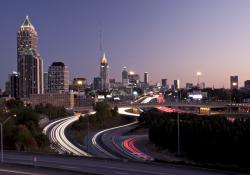The European Union Road Federation (ERF) has launched its position paper, Improved Signage for better Roads: An ERF Position Paper towards improving Traffic Signs in European Roads, which is aimed at a broad range of stakeholders and seeks to identify key actions that ERF and its members believe should be prioritised so that traffic signs can continue serving the needs of Europe’s road users.
Vertical signage is an essential element not only of a modern and well-maintained road infrastructure, but also of a safe and functional road network. Road signs help regulate traffic, provide crucial visual guidance, and give drivers important preview especially during night-time conditions.
Well maintained and efficient signage placement becomes even more necessary when taking into account the ageing population in Europe, in combination with the increasing cross-border traffic and the advancement of existing and new technologies. As the needs of European road users change over time, road infrastructure needs to keep up, if not lead.
The paper advocates, first of all, that authorities avoid or tackle the over-proliferation of traffic signs and to ensure that those installed display a clear message, in order to achieve better road safety and traffic flow, and good use of public resources.
Road authorities need to set a multiannual maintenance action plan, either in the form of comprehensive asset management plan, or the replacement of traffic Signs at fixed time intervals.
In addition, the ERF advocates the need to adapt to the needs of an ageing driver population, by introducing minimum maintenance standards for safety critical signs under the Vienna Convention.
Finally, this Position Paper calls for all stakeholders involved to examine the benefits of greater harmonisation of signs within the Vienna Convention to maximise the safety benefits of new vehicle technologies such as intelligent speed adaptation, as well provide for a more familiar environment for increasing cross-border traffic volumes.
Vertical signage is an essential element not only of a modern and well-maintained road infrastructure, but also of a safe and functional road network. Road signs help regulate traffic, provide crucial visual guidance, and give drivers important preview especially during night-time conditions.
Well maintained and efficient signage placement becomes even more necessary when taking into account the ageing population in Europe, in combination with the increasing cross-border traffic and the advancement of existing and new technologies. As the needs of European road users change over time, road infrastructure needs to keep up, if not lead.
The paper advocates, first of all, that authorities avoid or tackle the over-proliferation of traffic signs and to ensure that those installed display a clear message, in order to achieve better road safety and traffic flow, and good use of public resources.
Road authorities need to set a multiannual maintenance action plan, either in the form of comprehensive asset management plan, or the replacement of traffic Signs at fixed time intervals.
In addition, the ERF advocates the need to adapt to the needs of an ageing driver population, by introducing minimum maintenance standards for safety critical signs under the Vienna Convention.
Finally, this Position Paper calls for all stakeholders involved to examine the benefits of greater harmonisation of signs within the Vienna Convention to maximise the safety benefits of new vehicle technologies such as intelligent speed adaptation, as well provide for a more familiar environment for increasing cross-border traffic volumes.











